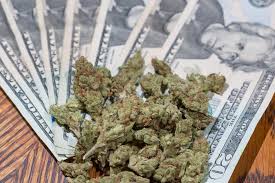House of Representatives Passes Bill Aimed at Marijuana Industry Financial Reforms

Noah Smith, an Associate at The Volkov Law Group, rejoins us for an update on the banking and marijuana industries. Noah can be reached at [email protected].
A new bill that would make it easier for financial institutions to provide services to “marijuana-related businesses” has passed the U.S. House of Representatives 321-103 with strong bipartisan support. The Secure and Fair Enforcement Banking Act of 2019 (colloquially known as the “SAFE Banking Act”) promises protections for financial institutions that choose to do business with the marijuana industry in states where marijuana has been legalized.
Currently, financial institutions that serve the legal marijuana industry run the risk of being prosecuted under a broad range of federal statutes, including the Controlled Substances Act (“CSA”), the federal money laundering statute, the federal unlicensed money transmitter statute, the Bank Secrecy Act (“BSA”), and even the Racketeer Influenced and Corrupt Organizations (“RICO”) Act. The potential penalties are serious and include, for example, stripping banks of their Federal Deposit Insurance Corporation (“FDIC”) insurance, so most financial institutions have opted to avoid dealing with the legal marijuana industry altogether. The resulting inability of most marijuana growers and dispensaries to access traditional financial services, including loans, lines of credit, and even checking accounts, has forced them to deal exclusively in large sums of cash, causing widespread security concerns and expansionary constraints. In particular, the use of cash has made marijuana companies prime targets for theft and other criminal activities.
The SAFE Banking Act aims to address these issues. If ultimately enacted into law, the SAFE Banking Act would clarify the legal landscape for the financial services industry by (1) legalizing the proceeds derived from legitimate marijuana-related businesses and (2) prohibiting government regulators from punishing those financial institutions that serve marijuana companies.[1] While this legislation would do nothing to alter marijuana’s status as a Schedule I drug under the CSA, it would prevent federal law enforcement from cracking down on financial institutions for treating state-legalized marijuana firms like ordinary account holders. This arrangement would reassure financial institutions that they can be safe from legal penalties for engaging with marijuana-related businesses, while allowing the marijuana industry full access to the traditional financial services it currently lacks. Permitting financial institutions to engage with marijuana companies without fear of reprisal would bring the marijuana industry out of the financial shadows and integrate it further into the mainstream economy.

The House’s passage of the SAFE Banking Act marks the first time in history that either chamber of Congress has acted to advance a piece of standalone marijuana legislation. While opponents of the SAFE Banking Act argue that the bill could provide drug cartels with an easier means of laundering money, the bill’s supporters believe it addresses urgent public safety concerns while preserving states’ rights. Financial institutions have largely thrown their weight behind the legislation, asking lawmakers for greater clarity on how to transact with marijuana companies in those states where it is legal. In a recent letter to House leadership, the American Bankers Association, the Credit Union National Association, the Independent Community Bankers of America, and the National Bankers Association asserted that their “members are committed to serving the financial needs of their communities, including those that have voted to legalize [marijuana]” and that the “current threat of criminal and civil liability under federal law is suppressing the provision of vital financial services in the thirty-three states that have legalized [marijuana] in some form.” Concurrently, a consortium of 50 different state banking associations submitted a similar letter, noting to House leadership that the current state of affairs “den[ies] the states the efficiencies . . . of more modern payment methods . . . [and] significantly increases state compliance auditing costs, since operating on an all-cash basis leaves no paper trails for auditors to follow.” The size of the state-legalized marijuana market, which is projected to grow to $30 billion by 2025, is becoming too large for financial institutions to ignore. But the lingering threat of criminal prosecution and regulatory consequences has made all but the most specialized, localized banks and credit unions wary of doing business with the industry. The SAFE Banking Act would effectively shield financial institutions that choose to work with legal marijuana businesses from these adverse consequences.

With passage in the House, the SAFE Banking Act now makes its way to the U.S. Senate, but the bill’s fate in the upper chamber remains uncertain. According to Senate Banking, Housing, and Urban Affairs Committee Chairman Michael Crapo (R-ID), who does not support the federal legalization of marijuana, the Senate will vote on some variety of marijuana-related financial services legislation “before the end of the year.” Senator Crapo left open the question of whether the Senate’s attempt at marijuana banking reform will be a version of the SAFE Banking Act or a separate piece of legislation, noting that the Senate “may craft [its] own bill.” The Senate Banking, Housing, and Urban Affairs Committee last held a hearing on the challenges faced by marijuana-related businesses in late July 2019. What remains clear is that tough work still lies ahead for those lawmakers and advocates who hope to enact the SAFE Banking Act into law. While industry observers remain hopeful, most signs point to a lack of consensus for the foreseeable future.
[1] Section 2 of the SAFE Banking Act states that a “[f]ederal banking regulator may not . . . prohibit, penalize, or otherwise discourage a depository institution from providing financial services to [marijuana]-related legitimate business[es] or service provider[s].” Section 3 of the SAFE Banking Act states that “[f]or the purposes of . . . all . . . provisions of federal law, the proceeds from a transaction involving activities of a [marijuana]-related legitimate business or service provider shall not be considered proceeds from an unlawful activity solely because . . . the transaction involves proceeds from . . . [marijuana]-related activities.”















